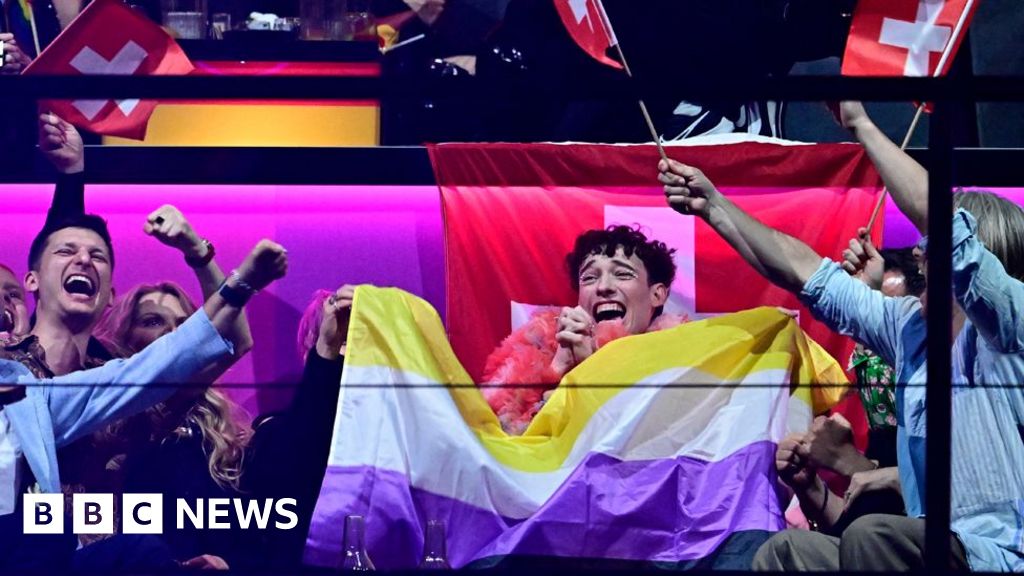Eurovision song contest: EU lodges official complaint over flag ban

The European Union has lodged an official complaint with the organisers of the Eurovision Song Contest over its refusal to let participants wave the bloc’s flag at last Saturday’s final.
“Such actions cast a shadow over what is meant to be a joyous occasion for peoples across Europe,” European Commission Vice-President Margaritis Schinas wrote to the European Broadcasting Union (EBU).
The complaint comes after politician Dorin Frasineanu from the Alliance of Liberals and Democrats for Europe Party said he had been “denied entry to Eurovision with the EU flag”.
According to EBU rules only flags of “participating countries and the rainbow/pride flags” are allowed inside the contest venue.
A spokesperson for the EBU said the flag policy this year was “the same as 2023”.
“With the EU being targeted by malicious and authoritarian actors, EBU’s decision contributed to discrediting a symbol that brings together all Europeans,” said Mr Schinas in his complaint.
He demanded the broadcaster “explain the rationale behind this decision and attribute responsibility where it is due”.
“The incoherence in the EBU’s stance left myself and millions of viewers wondering for what and for whom the Eurovision Song Contest stands,” Mr Schinas added.
Speaking to reporters on Monday afternoon, European Commission spokesperson Eric Mamer said it was “completely regrettable that the flag of all the EU members taking part in the competition… could not be shown”.
The European Commission will “make the point very clearly that there’s no reason not to allow this flag, in fact we would encourage the EBU to allow and ensure it is shown”, Mr Mamer said.
He also clarified that as the Eurovision Song Contest was not organised by the EU, they could only make their views known and encourage the EBU to “understand it was a mistake”.
In an interview with Politico, Mr Schinas said the EBU’s decision to ban EU flags during Saturday’s Eurovision final was a gift to “the enemies of Europe”.
“Who wins from banning the EU flag from Eurovision?” the commissioner added. “Only the Eurosceptics and the enemies of Europe.”
In a statement to the BBC, the EBU said the flag policy had been agreed with SVT, the Swedish broadcaster and host of this year’s contest, but stressed this did not feature an explicit provision to ban EU flags.
“As in previous years such as 2023, SVT’s policy was to allow the flags of the participating countries and the rainbow flags.
“There has never been an express ban on the EU flag in the written policy,” an EBU spokesperson said.
“Due to heightened geopolitical tensions, the flag policy was more rigorously enforced by security at this year’s event.”
MEP and former Belgian Prime Minister Guy Verhofstadt wrote on X: “As the EU flag is banned from Eurovision, people risk being beaten to demand a European path for Georgia.
“Freedom, democracy can never be taken for granted!”
The row follows a string of controversies that marred this year’s song contest, including the last-minute expulsion of Dutch entrant Joost Klein, the withdrawal of a contestant from rehearsals and another contestant breaking the rules with an on-stage speech calling for peace.
There were also tensions over Israel’s presence in the competition and pro-Palestinian protests outside the venue.
The EU flag was not the only one under scrutiny, with the contest’s winner Nemo – a 24-year-old Swiss musician who uses they/them pronouns – said they had to smuggle their own non-binary flag into the venue because Eurovision had refused to allow it.
Nemo said they “did it anyway”, before calling out the “double standards” of the organisers who were reported to have forced some fans to throw away their non-binary flags before being allowed in.
Related
European leaders push defense spend amid uncertainty over Trump aid…
This week, the European Commission proposed measures for fiscal flexibility on defense spending and a plan to borrow 150 billion euros ($163 b
Europe rallies behind Zelensky as US announces new talks with…
EU leaders rallied around Ukraine and agreed to boost the bloc's defences at a crisis summit Thursday, as Washington said talks with Kyiv were back on track
European markets recoup most losses; Autos gain on tariff exemption
This was CNBC's live blog covering European markets. European markets ended around the flatline on Thursday after a choppy day of trading as i
Jesse Eisenberg Granted Polish Citizenship: ‘I Am Happy to Be…
Jesse Eisenberg has been granted Polish citizenship by the European country’s president, just months after the actor, writer and director applied.Eisenberg wa












